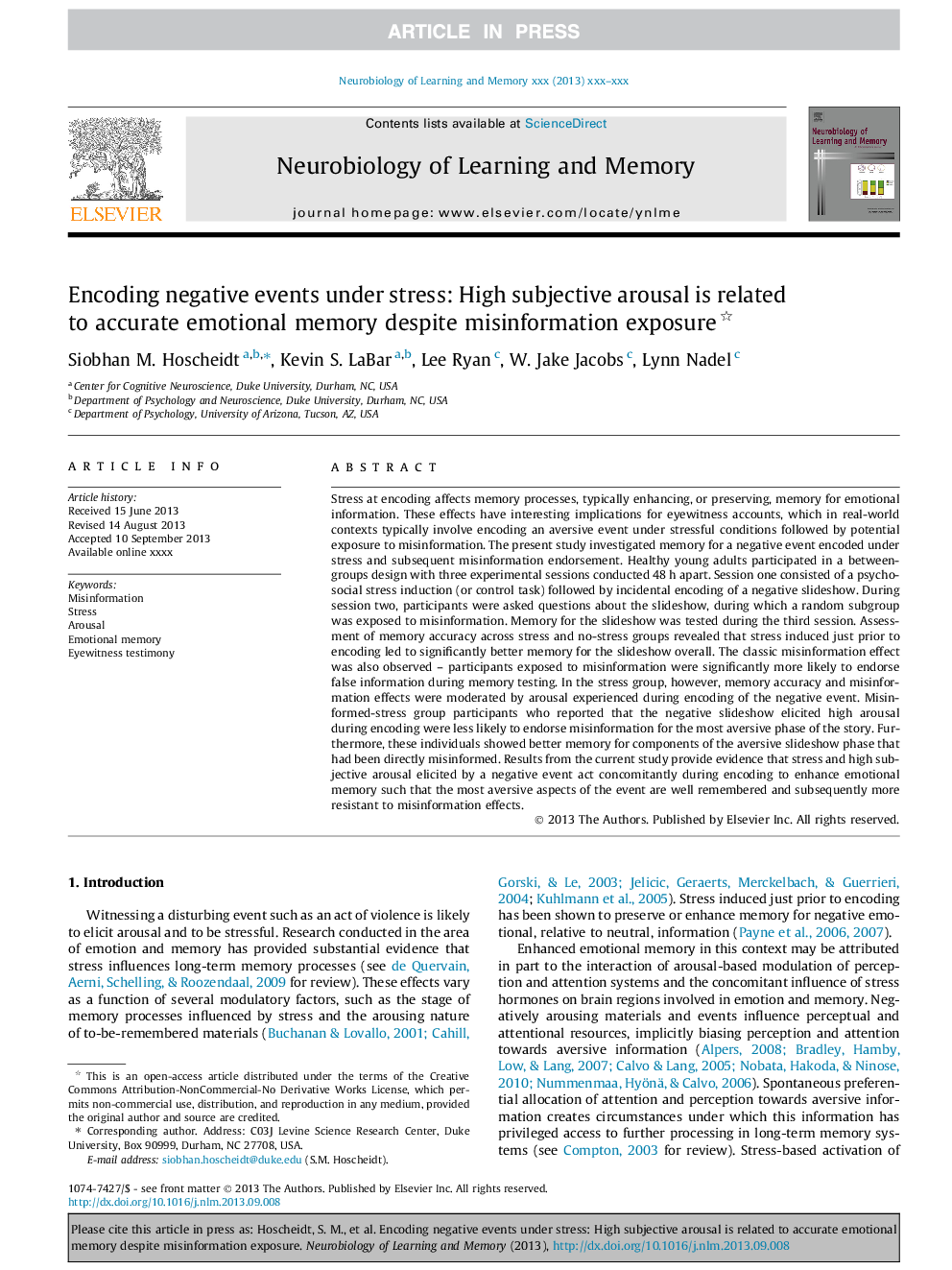| کد مقاله | کد نشریه | سال انتشار | مقاله انگلیسی | نسخه تمام متن |
|---|---|---|---|---|
| 7300391 | 1475163 | 2014 | 11 صفحه PDF | دانلود رایگان |
عنوان انگلیسی مقاله ISI
Encoding negative events under stress: High subjective arousal is related to accurate emotional memory despite misinformation exposure
ترجمه فارسی عنوان
رمزگذاری رویدادهای منفی تحت استرس: تحریک ذهنی بالا نسبت به حافظه دقیق عاطفی با وجود اطلاعات جسمی مرتبط است
دانلود مقاله + سفارش ترجمه
دانلود مقاله ISI انگلیسی
رایگان برای ایرانیان
کلمات کلیدی
اطلاعات غلط، فشار، انگیختگی، حافظه احساسی، شهادت شهادت
ترجمه چکیده
استرس در رمزگذاری بر فرایندهای حافظه تأثیر می گذارد، عموما حافظه را برای اطلاعات عاطفی تقویت یا حفظ می کند. این اثرات پیامدهای جالبی برای حساب های شاهد عینی دارند که در حوزه های واقعی جهان معمولا شامل رمزگذاری یک رویداد حوادث تحت شرایط استرس زا و بالقوه قرار گرفتن در معرض اطلاعات غلط است. در این مطالعه، حافظه برای یک رویداد منفی که تحت استرس و کدگذاری اطلاعات غلط است، بررسی شده است. سالمندان جوان سالم در طراحی گروهی با سه جلسه تجربی انجام دادند که 48 ساعت و 48 ساعت از هم جدا بودند. جلسه اول شامل القای استرس روانی (یا کار کنترل) همراه با رمزگذاری تصادفی یک نمایش اسلاید منفی بود. در طول جلسه دو نفر از شرکت کنندگان در مورد نمایش اسلاید سوالاتی پرسیدند که طی آن یک زیرگروه تصادفی در معرض اطلاعات غلط قرار گرفت. حافظه برای نمایش اسلاید در طول جلسه سوم آزمایش شد. ارزیابی دقت حافظه در گروه های استرس و بدون استرس نشان داد که استرس ناشی از قبل از رمزگذاری به طور کلی به طور قابل توجهی بهبود یافته است. اثر غلطی از اطلاعات کلاسی نیز مشاهده شد - شرکت کنندگان در معرض اطلاعات غلط به احتمال زیاد به تایید اطلاعات غلط در آزمون حافظه قابل توجه بودند. با این حال، در گروه استرس، دقت حافظه و اثرات غلط اطلاعات با تحریک در طی کدگذاری رویداد منفی تعدیل شد. شرکت کنندگان در گروه اطلاعاتی ناسازگار که گزارش دادند که نمایش اسلاید منفی باعث تحریک زیاد در هنگام رمزگذاری شد، کمتر احتمال دارد که اطلاعات غلط را برای فاجعه ترین مرحله داستان تثبیت کنند. علاوه بر این، این افراد حافظه بیشتری را برای اجزای فاز نمایش به صورت اسلایدهای ناخوشایند نشان دادند که مستقیما به اطلاعات غلط داده شده بود. نتایج پژوهش حاضر نشان می دهد که استرس و تحریک ذهنی بالا منجر به یک رویداد منفی همراه با هم در طی رمزگذاری برای افزایش حافظه احساسی به طوری که بیشتر جنبه های حوادث از این رویداد به خوبی به یاد می آورند و پس از آن مقاوم تر به اثرات سوء اطلاعات.
موضوعات مرتبط
علوم زیستی و بیوفناوری
علم عصب شناسی
علوم اعصاب رفتاری
چکیده انگلیسی
Stress at encoding affects memory processes, typically enhancing, or preserving, memory for emotional information. These effects have interesting implications for eyewitness accounts, which in real-world contexts typically involve encoding an aversive event under stressful conditions followed by potential exposure to misinformation. The present study investigated memory for a negative event encoded under stress and subsequent misinformation endorsement. Healthy young adults participated in a between-groups design with three experimental sessions conducted 48Â h apart. Session one consisted of a psychosocial stress induction (or control task) followed by incidental encoding of a negative slideshow. During session two, participants were asked questions about the slideshow, during which a random subgroup was exposed to misinformation. Memory for the slideshow was tested during the third session. Assessment of memory accuracy across stress and no-stress groups revealed that stress induced just prior to encoding led to significantly better memory for the slideshow overall. The classic misinformation effect was also observed - participants exposed to misinformation were significantly more likely to endorse false information during memory testing. In the stress group, however, memory accuracy and misinformation effects were moderated by arousal experienced during encoding of the negative event. Misinformed-stress group participants who reported that the negative slideshow elicited high arousal during encoding were less likely to endorse misinformation for the most aversive phase of the story. Furthermore, these individuals showed better memory for components of the aversive slideshow phase that had been directly misinformed. Results from the current study provide evidence that stress and high subjective arousal elicited by a negative event act concomitantly during encoding to enhance emotional memory such that the most aversive aspects of the event are well remembered and subsequently more resistant to misinformation effects.
ناشر
Database: Elsevier - ScienceDirect (ساینس دایرکت)
Journal: Neurobiology of Learning and Memory - Volume 112, July 2014, Pages 237-247
Journal: Neurobiology of Learning and Memory - Volume 112, July 2014, Pages 237-247
نویسندگان
Siobhan M. Hoscheidt, Kevin S. LaBar, Lee Ryan, W. Jake Jacobs, Lynn Nadel,
